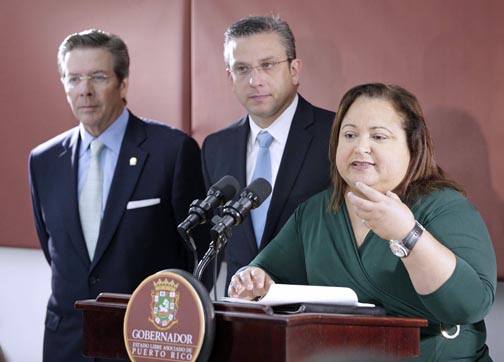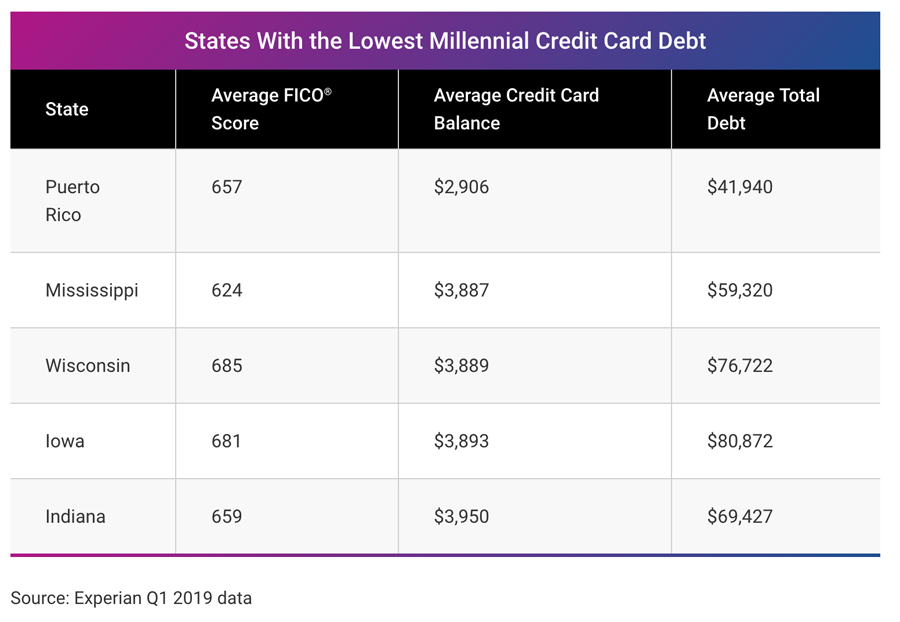Puerto Rico has ‘no plans’ to default, gov’t officials say


Treasury Secretary Melba Acosta (at podium) offers details of the Recovery Act, as GDB Chairman David Chafey and Gov. García-Padilla stand by during a press conference in late June.
High-ranking Gov. García-Padilla administration officials came out once again in defense of recent decisions aiming to boost Puerto Rico’s credit and ensure long-term fiscal and economic sustainability — most of which have generated strong backlash from stateside ratings agencies.
Furthermore, during a roundtable with members of the local media, Treasury Secretary Melba Acosta-Febo and Government Development Bank Chairman David Chafey were adamant in saying that the government has no plans to default on its obligations.
However, they admitted that the government’s decision to pass the Public Corporation Debt Enforcement and Recovery Act last month was driven by fiscal problems plaguing the Puerto Rico Electric Power Authority and not as a way to avoid obligations, as credit agencies have noted.
“There has been speculation that passage of the Recovery Act indicates a shift in the Commonwealth’s commitment to honoring its financial obligations. To the contrary, the explicit aim of the Recovery Act is to protect and strengthen the General Fund, our GO credit, and the GDB by giving public corporations the opportunity to address their financial challenges once and for all without being a drain on the General Fund,” said Acosta-Febo.
“The Recovery Act specifically excludes the Commonwealth, all of its municipalities, the GDB and COFINA and in no way alters our commitments to honor our GO, COFINA and other related credits,” she said.
The law shelters public corporations, such as PREPA, whose fiscal predicament has it on the brink of defaulting.
“We had to think of the worst case scenario. If PREPA is unable to pay its debts, a trustee will come in and take control. That trustee would come in to sell PREPA off in pieces to pay creditors. We passed this law in part to give PREPA room to sit down and negotiate with its creditors,” Acosta-Febo said.
Puerto Rico’s public corporations fall through the cracks of the U.S. Bankruptcy Code, as they cannot seek relief under Chapter 11, used by privately held companies, and are not eligible to seek relief under Chapter 9, she said.
Attempting to get Congress to amend the tax code to include Puerto Rico’s public corporations was something that “would take time,” prompting the local government to act quickly on its own, she said.
The Recovery Act, she said, was crafted with the support of the U.S. government, to facilitate an orderly adjustment of a public corporation’s obligations while enabling them to continue providing critical services to residents and businesses in the Commonwealth.
“The U.S. Supreme Court has clearly established a sovereign’s right to pass debt enforcement laws when such relief is not provided by federal statute. We stand behind the Act and will defend it as a reasonable and necessary measure to protect the interests of all stakeholders of our public corporations,” she said.
‘Establishing a stronger foundation’
For his part, Chafey said by providing public corporations with another tool in their path to becoming self-sustaining businesses, Puerto Rico is establishing a stronger foundation for longer-term economic improvements.
Since the passage of the law in late June, stateside credit agencies Moody’s, Standard & Poor’s and Fitch have taken actions to further downgrade Puerto Rico’s ratings, pushing PREPA’s further into junk.
Those decisions, Acosta-Febo and Chafey said, are “completely unfair.”
“We disagree with the downgrades for several reasons. This law has been approved but so far, nobody has sought its protection,” Acosta-Febo said.
“They are concluding that if one agency seeks protection, the entire government will do the same. We believe it will be the complete opposite. This is the avenue for public corporations to solve their situations on their own, it isolates the problems to the public corporations,” she noted.
The idea, Chafey said, is to use the law in a responsible manner.
“The belief is that everything will be affected, which is why they have downgraded the ratings for everything. But we differ,” he said.
In their assessments, the agencies suggested that by passing the Recovery Act, the Puerto Rican government rescinded on its long-standing promise to pay its debt.
“But what we say and have always said is that the debt is guaranteed by the constitution and we have to pay it, because we have no other option. Public corporations are not part of the central government,” she said.
“That law was passed with PREPA in mind, that’s the truth. But we also believe that if the government has the chance to position itself in equal footing with the rest of the states, then why not do it? Puerto Rico faced discrimination when it was excluded from the U.S. bankruptcy law,” Acosta noted.
Saying that the government as a whole will seek protection from the Recovery Act is “completely mistaken and is not based on what we’ve done at all,” the Treasury chief said.
Webcast scheduled
Meanwhile, the government officials confirmed that the GDB is scheduled to host a webcast with investors to update them on what has been going on. Although no date was announced, Acosta said the call will come after the government releases a number of public documents, including the Commonwealth Report.
“I trust that after we communicate what we’re doing to investors and they understand what the plan is, everybody will reconsider and we’ll be able to go back to the market at reasonable prices,” he said, noting that for now, the GDB has about a year of liquidity following the $3.5 billion emission in March.














False equivalence, Acosta. You know full well why Puerto Rico’s public corporations do not enjoy Chapter 11 protection. It’s part of the deal with the devil to exempt Puerto Rico bonds from Federal taxation and has been in place since the ELA was created. We have been coasting on borrowed money made attractive on that exemption for too long. The most basic rule of American government is that you cannot have taxation without representation; the flip side of that coin is that neither can you have representation without taxation. Stop grandstanding to the ignorant masses, Acosta, and fix the mess you helped create. Legally.